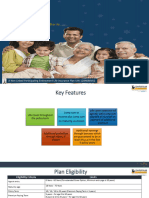Bad Meetings
Uploaded by
agnieszkabernacka7Bad Meetings
Uploaded by
agnieszkabernacka7A A BUSINESS ENGLISH IN VIDEO
Bad meetings
Lesson code: 11SU-G5ZC-6U5J ADVANCED
1 Warm-up
How often do you attend meetings in your work? Are they always productive?
2 Idiomatic expressions
What do you think the underlined phrases and idioms mean? In pairs, match them to their correct
meaning below:
1. I'm not going to stand for his behaviour anymore. I need to fire him.
2. After his manager refused to pay him his bonus, Joe decided to make a stink.
3. The meeting we attended was a total train wreck. Every second was a disaster.
4. The solution to this problem is right at your fingertips. You just need to look at it again.
5. I'm not looking forward to tomorrow's meeting. I can't wait to get it done with.
a. a chaotic or disastrous situation
b. easily obtained
c. finish completely so that you can continue doing other things
d. take strong and forceful action to show that you are not satisfied with a situation
e. tolerate
3 Before you watch
You are going to watch David Grady talk about how bad, inefficient and overcrowded meetings
negatively affect businesses and employees. What do you think he is going to say?
You can review this worksheet online at www.linguahouse.com/ex 1/3
Review your flashcards at least 3-5 times a week for 20 minutes to keep the material fresh in your memory.
c Linguahouse.com
Bad meetings
A A A A BUSINESS ENGLISH IN VIDEO
4 What do you remember?
Answer the questions below in your own words.
1. According to David, what are meeting organisers stealing from us?
2. What is Mindless Accept Syndrome (MAS)?
3. What is the key to success in an organisation?
4. What has dramatically changed the way we work?
5. What did David do that proved we have a global problem with meetings?
6. What is the common theme in the comments that were posted online under his video?
7. How does he propose to stop mindlessly accepting meeting invitations?
5 Words in the video
Look at the transcript of the talk. Find a word or phrase which means ...
1. a small partitioned area of an office containing a desk (noun, P1)
2. a disease that spreads rapidly and widely among the population in an area (noun, P3)
3. spreading widely throughout an area or a group of people (adjective, P4)
4. omit (verb, P5)
5. not certain (adjective, P7)
6 Phrasal verbs
Read the transcript of the talk and complete the definitions below with the infinitive forms of the
underlined phrasal verbs.
1. : to perform something as if you are in a play or film
2. : to continue
3. : to start doing something suddenly and energetically, often without stopping to think
4. : to suddenly appear
5. : to be published online
6. : to distribute (something)
7. : to be present in every part of something
8. : to become familiar with somewhere new
Now give your own example sentence for each phrasal verb.
You can review this worksheet online at www.linguahouse.com/ex 2/3
Review your flashcards at least 3-5 times a week for 20 minutes to keep the material fresh in your memory.
c Linguahouse.com
Bad meetings
A A A A BUSINESS ENGLISH IN VIDEO
7 Collocations
Match the adjectives and nouns to form collocations from the talk.
1. an unproductive a. belief
2. a global b. decision
3. an involuntary c. epidemic
4. a fundamental d. meeting
5. a thoughtful e. reflex
Now make a sentence about the topic of the talk for each phrase.
8 Talking point
Discuss any of the questions below.
1. What do you think of David's talk? Do you share his opinions?
2. Do you think his proposal would work in your company?
3. What kind of issues should/shouldn't be discussed at meetings?
You can review this worksheet online at www.linguahouse.com/ex 3/3
Review your flashcards at least 3-5 times a week for 20 minutes to keep the material fresh in your memory.
c Linguahouse.com
You might also like
- 09-SAMSS-071 - (2016) Qualification Requirements For Inorganic Zinc Primer (APCS-17A) and (APCS-17B)100% (1)09-SAMSS-071 - (2016) Qualification Requirements For Inorganic Zinc Primer (APCS-17A) and (APCS-17B)9 pages
- Bad Meetings British English Teacher Ver2No ratings yetBad Meetings British English Teacher Ver27 pages
- Can We Make A Start Now?: Business English For Meetings: Part 2No ratings yetCan We Make A Start Now?: Business English For Meetings: Part 235 pages
- bad-meetings-british-english-teacher-B2-C1No ratings yetbad-meetings-british-english-teacher-B2-C114 pages
- bad-meetings-british-english-teacher-B2-C1No ratings yetbad-meetings-british-english-teacher-B2-C114 pages
- Bad Meetings American English Student C1 C2No ratings yetBad Meetings American English Student C1 C28 pages
- Leading Meetings: in Company Upper-Intermediate - Second Edition Answer Key: Unit 6No ratings yetLeading Meetings: in Company Upper-Intermediate - Second Edition Answer Key: Unit 66 pages
- ESL-Brains-Im-afraid-thats-outside-the-scope-of-this-meeting-SV-5289No ratings yetESL-Brains-Im-afraid-thats-outside-the-scope-of-this-meeting-SV-52894 pages
- 6.1 Meeting 1 Getting Down To Business WorksheetNo ratings yet6.1 Meeting 1 Getting Down To Business Worksheet3 pages
- British Council Global English Your Practical Handbook For BusinessNo ratings yetBritish Council Global English Your Practical Handbook For Business31 pages
- sample Business English booklet_book2_pages13467No ratings yetsample Business English booklet_book2_pages134675 pages
- Level 2 Business Communication Booklet-1No ratings yetLevel 2 Business Communication Booklet-171 pages
- Business English Vocabulary from Intermediate to Advanced levels (1)No ratings yetBusiness English Vocabulary from Intermediate to Advanced levels (1)33 pages
- Classic-business-meetings-17PAGES. Con Todos Los Apuntes en La ClaseNo ratings yetClassic-business-meetings-17PAGES. Con Todos Los Apuntes en La Clase19 pages
- Meetings 1 - Getting Down To Business - WorksheetsNo ratings yetMeetings 1 - Getting Down To Business - Worksheets5 pages
- Meetings - Small Talk & Starting A Meeting100% (1)Meetings - Small Talk & Starting A Meeting14 pages
- Phrasal Verbs About Meetings CLT Communicative Language Teaching Resources Conv - 117601No ratings yetPhrasal Verbs About Meetings CLT Communicative Language Teaching Resources Conv - 11760114 pages
- 22 Business English Expressions You Cant Live Without and How To Use ThemNo ratings yet22 Business English Expressions You Cant Live Without and How To Use Them8 pages
- 2493672-d5d935925bc9dedc3f98b538e449f90a-English_for_Meetings_Unit_02No ratings yet2493672-d5d935925bc9dedc3f98b538e449f90a-English_for_Meetings_Unit_0220 pages
- The Non-Obvious Guide to Better Presentations: How to Present Like a Pro (Virtually or in Person)From EverandThe Non-Obvious Guide to Better Presentations: How to Present Like a Pro (Virtually or in Person)No ratings yet
- How To Rehearse In Order To Give The Perfect Speech: How To Effectively Rehearse Your Next Speech So That Your Message Will Be Remembered Forever!From EverandHow To Rehearse In Order To Give The Perfect Speech: How To Effectively Rehearse Your Next Speech So That Your Message Will Be Remembered Forever!No ratings yet
- Lecture - 1 - Materials - by Prof. Manu Santhanam, 13.01.2024No ratings yetLecture - 1 - Materials - by Prof. Manu Santhanam, 13.01.202440 pages
- Faculty Recruitment: The National Institute of Engineering, Mysuru - 570 008No ratings yetFaculty Recruitment: The National Institute of Engineering, Mysuru - 570 0082 pages
- Sequencing Problems Processing N Jobs Through M Machines Problem Example PDF100% (1)Sequencing Problems Processing N Jobs Through M Machines Problem Example PDF2 pages
- Visual Sequencing Cards For Personal Hygiene Skills in The Bathroom BundleNo ratings yetVisual Sequencing Cards For Personal Hygiene Skills in The Bathroom Bundle23 pages
- The Nature of Educational Research WorksheetNo ratings yetThe Nature of Educational Research Worksheet2 pages
- Rethinking Islamic Fundamentalism in PakistanNo ratings yetRethinking Islamic Fundamentalism in Pakistan17 pages
- Bagumbayan-Vnp Movement, Inc. vs. ComelecNo ratings yetBagumbayan-Vnp Movement, Inc. vs. Comelec6 pages
- TOSHIBA Thermal Printer B-SX6T/SX8T SERIES Maintenance ManualNo ratings yetTOSHIBA Thermal Printer B-SX6T/SX8T SERIES Maintenance Manual24 pages
- ANNEX 1 (JHRA for 69kV Protection Line System)No ratings yetANNEX 1 (JHRA for 69kV Protection Line System)2 pages
- 1 Intro Rizal Family Background LWW Rizal 2021No ratings yet1 Intro Rizal Family Background LWW Rizal 202133 pages
- Indian Armed Forces - Non Contact WarfareNo ratings yetIndian Armed Forces - Non Contact Warfare6 pages
- Name: Ayanna Spence Grade: 11U Teacher: MR Haughton Subject: Biology Date: September 13, 2019No ratings yetName: Ayanna Spence Grade: 11U Teacher: MR Haughton Subject: Biology Date: September 13, 201918 pages
- Review Materials: Prepared By: Junior Philippine Institute of Accountants UC-Banilad Chapter F.Y. 2019-2020No ratings yetReview Materials: Prepared By: Junior Philippine Institute of Accountants UC-Banilad Chapter F.Y. 2019-202014 pages
- Introduction To Cryptography With Coding Theory. 3rd Edition Lawrence C. Washington & Wade Trappe. 2024 Scribd Download100% (6)Introduction To Cryptography With Coding Theory. 3rd Edition Lawrence C. Washington & Wade Trappe. 2024 Scribd Download62 pages
- Shriram Life Golden Premier Saver - Website VersionNo ratings yetShriram Life Golden Premier Saver - Website Version21 pages

























































































